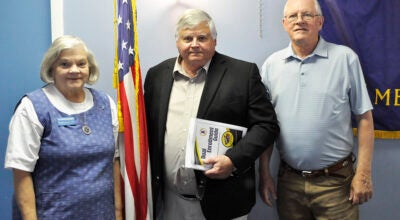TCS to dip into reserves to offset expenses
Published 11:00 pm Thursday, September 1, 2011
The proposed 2012 budget for the Troy City Schools pulls some $2.6 million from reserves to offset expenses and efforts to reinvest in the students and the schools.
Lee Hicks, superintendent, said during Thursday’s public budget hearing that dipping into the system’s $7.3 million reserve was not an easy decision, but it was a necessary one.
“There’s going to be people out there who believe we’ve simply dipped into the reserves … but we’re doing so because these are all things we need to do to get our schools and students where they need to be. We’re talking about necessities: renovations to lunchroom facilities, computers, technology …
“A lot of things needed to be done a while ago, but just got put on the back burner.”
For the fiscal year beginning Oct. 1, the district expects revenues of $18.4 million and expenditures of nearly $24 million.
The revenue sources include more than $10 million in state revenues; more than $2 million in federal revenues; and more than $5.4 million in local revenues. About $2.6 million – or just under two months’ operating expenses – will be pulled from the system’s $7.3 million reserve fund to offset the shortfalls between projected revenues and expenses.
“Right now, this budget is based on full state funding, “ said Mickey Daughtry, chief financial officer for the district. “If the governor were to declare proration after Oct. 1, we would obviously go back and reduce state revenues and expenses.”
Two additional factors affect the revenue projections this year: the district lost more than $2 million in federal funding that came from stimulus projects and the district is losing about $200,000 due to changes in the allocation of local tax revenues. A portion of the tax revenues is split between the city school and the Pike County Schools, with the funds prorated based on student population. For the first time this year, the Troy City Schools will receive the smaller allocation.
“It’s 51.6 percent to the county, 48.6 percent to the city,” Daughtry said. “That’s about $200,000 or $13,000 a month.”
It’s a sizeable figure, Hicks said. “You can do a whole lot with $13,000 a month,” he said, adding that the annual loss would pay for three teachers (including benefits) or “if you’re talking about computers, which run about $800 for a desktop unit, you could go a long way to putting new computers in the all the classrooms.”
The changes are due to a decline in student population at Troy City Schools. Since 2005, the district’s enrollment has dropped by more than 280 students. “But we’re up this year,” Hicks said. “And that growth is good. We’re building on that growth.”
The state revenue will fund 118 teacher units this year, with local revenues funding 17 units. Because it is using the reserve funds and reallocating other funding to help cover support staff expenses, the district is adding three full time positions and two part-time staff members: a counselor at the middle school, special education teachers at both the middle and elementary school, and two part-time reading and math coaches at the middle school.
“We did that because of the AYP results,” Hicks said. “We’re targeting areas where we had or could potentially have red cells in the upcoming year and providing additional teaching resources to help the students … we want to do everything we can to prevent red cells in the future.”
Both Daughtry and Hicks said the decision to invest in the additional staff, and other plans for growth in the coming year, is driven by necessity.
“We were losing student population,” Hicks said. “And we were going to see negative effects regarding the loss of that student population – including a loss in state and local revenues – if we’re not investing in our students and our schools.”
Daughtry added his perspective: “We’re going to either spend in a situation where you have control over how the money is used or spend it down the road, when the state forces you (to dip into reserves) because it cuts your funding.”
The district will hold another public budget hearing at 3 p.m. Sept. 8 at the school board offices. The budget will be presented to the school board at its Sept. 19 meeting for approval.





